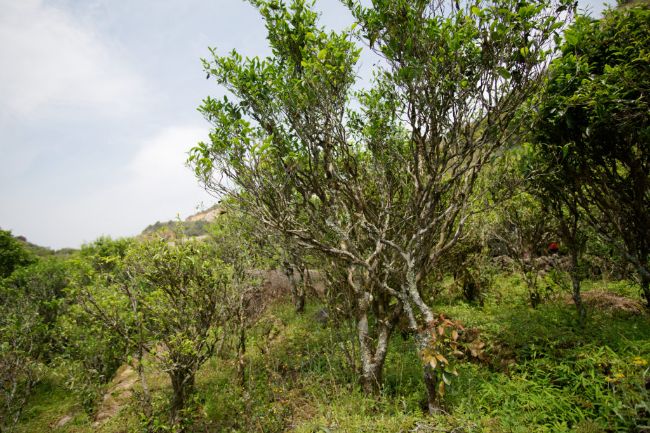
Oolong is a semi-oxidized style of tea which exhibits characteristics of both black and green tea.
What is the meaning of oolong?
The word "oolong" is derived from the Chinese term "wu-long", which means "black dragon".
The name is said to reflect the dark, twisted appearance of the tea leaves.
What is oolong tea?
Oolong is a diverse category of tea, with many distinct styles falling under the oolong umbrella.
Although this traditional Chinese tea is made from the same plant as white, green, or black tea, the oxidization level of oolong tea typically varies between 10 and 85%, which places it somewhere between green and black tea (red tea) on the oxidization spectrum. For example, green tea is either steamed or pan-fried in order to prevent oxidization, which allows it to maintain its striking green color, whereas black tea is fully oxidated, which is what gives the tea its dark appearance.
Since there are so many distinct styles of oolong tea, the flavor and aroma profiles, as well as its visual characteristics can vary wildly depending upon which type of oolong is being referred to.
The taste of oolong tea can range from light, grassy, fruity, and floral, such as is the case with Baozhong oolong tea, to dark and viscous, with notes of honey, peach, or roasted apricot, which is a prevalent and somewhat unique flavor profile among Dan Cong oolong teas.
Where does oolong tea come from?
Oolong tea originates from China, and specifically from the Fujian and Guangdong provinces. Since then, the production of oolong tea has migrated to other countries as well, including Taiwan and Ceylon, which is modern-day Sri Lanka.
There are three main stories involving the origin of oolong tea:
The tribute tea theory
The tribute tea theory states that the origin of oolong tea can be traced back to Beiyuan tea, which was one of the original tribute teas produced within the Fujian province. There are many historical records which document the production of Beiyuan tea, and the region, which is located near the Phoenix Mountains, is known to have grown tea since the Tang Dynasty.
Cai Wei, who was one of the officials of the era who was in charge of overseeing the production of tribute tea, wrote a document referred to as "Tea Records" in the year 1051 in which he provides a vivid description of early Beiyuan tea production, a process which is nearly identical to the methods used to produce modern oolong tea.
Zhang Ting Hui, who is often celebrated as the founder of Beiyuan tea, is said to have created the historical dragon-phoenix tribute tea cakes, which were quite popular during the Song Dynasty and led to the more recent terminology.
The Wuyi theory
The Wuyi theory regarding the origin of oolong tea comes from a book known as "Tea Tale", which was written by Wang Cao Tang, who was a scholar that lived during the Qing Dynasty.
This book also provides an accurate description of early oolong tea production. These methods are still used in the Wuyi region to produce traditional Chinese oolong tea and have been largely unchanged since ancient times.
It's said that oolong tea was named after the Wuyi mountains themselves.
The Anxi theory
The third theory involving the origin of oolong tea hails from the Anxi region of Fujian, China and involves a legend about Wu Liang.
The legend states that after harvesting some tea leaves from atop the local mountains, he intended to go home and process the tea, but became side-tracked by a deer and spent a good portion of the day hunting it. By the time he returned home with the deer, he noticed that his tea had become red around the edges. Having no time to return to the mountains and pick a new batch of tea, he decided to process it anyways, and was delighted by its unique taste and fragrance.
Based upon this accidental discovery, it's said that the local villagers developed the methods of Anxi oolong tea production.
It's thought that the etymology of the word wu-long, which later became oolong, was a transformation of the man's name, Wu Liang, which has a similar pronunciation.
Where to buy oolong tea?
If you're looking for the perfect oolong tea, then consider checking out our selection here at Leaves With Hugs : Oolong tea selection
Some of our bestsellers in the Oolong Tea category include Uplift and Inner Peace.
Hugs,
Admar
.png)

